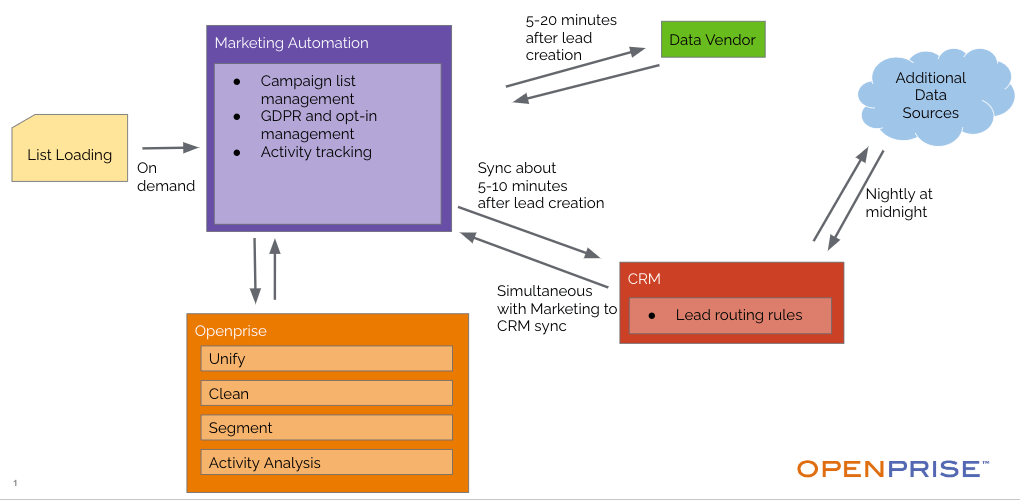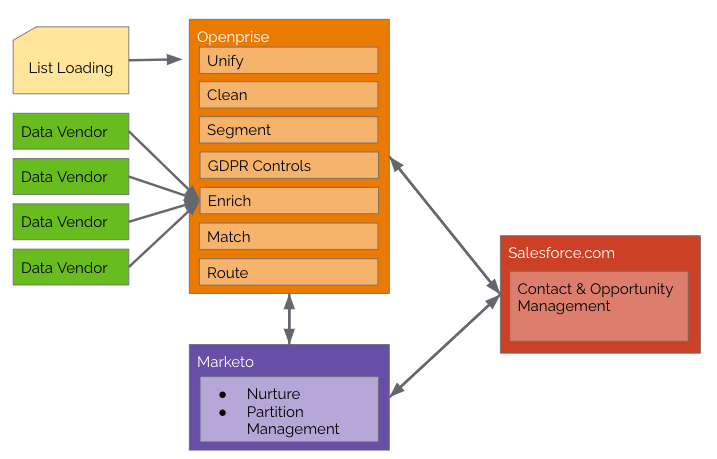
If your ops team isn’t giving you the right answers, ask better questions
This year, Openprise partnered with RevOps Co-op and MarketingOps to conduct a survey on data quality. This collaborative effort resulted in over 150 responses from operations professionals, giving us new insights into how people define data quality, what holds businesses back from achieving better data quality, and what patterns differentiate teams that achieve good data quality from the rest. One theme stood out: the gap in RevOps alignment with executives. Get the full report here.
In How to talk about data quality with execs, we showed how ops teams can translate their technical work into executive-relevant outcomes. But communication gaps go both ways—and too often, leaders don’t get full value from their RevOps teams simply because they’re asking the wrong questions.
Their expectations are mismatched and their mental models are just different.
If your ops team has ever bombarded you with detail when all you wanted was a recommendation, or you’ve walked out of a strategy meeting unsure what the takeaway was, it’s because you’re listening for outcomes but ops is speaking in processes. Here’s how to align the conversation.
The disconnect is costing you
According to the 2025 State of RevOps Survey:
- 71% of revenue operators say poor data quality hurts GTM execution
- 48% say leadership doesn’t understand what’s technically possible
- 79% report their company lacks a shared definition of data quality
In other words, most organizations don’t just struggle with data—they struggle with RevOps alignment with executives, and how to talk about data in a way that drives business decisions. And that leaves executives flying blind when it comes to budget tradeoffs, resource allocation, and strategy execution.
As one survey respondent put it:
“The leadership team does not see an issue with data quality and is not putting incentives out for users to adhere to data quality standards. Also, there is no budget for tools or FTEs to deal with this problem.”
If you’re getting technical responses to business questions, it’s likely because you never clarified the business outcome you’re seeking.
Why your ops team seems unresponsive (and what they’re waiting to hear)
Your ops team isn’t trying to stall your initiative. They’re trying to solve a puzzle with missing pieces.
Ops pros are problem-solvers. They dive deep into the details and gravitate toward systems, logic, and efficiency. But they can’t make strategic decisions for you. They need your input on the goal before they can recommend how to do it best.
For example, if you’ve been charged with cutting your budget by 20%, tell them that, then ask for input. You might get an answer like these:
“We have 3 tools that do the same thing, and only 5% of the sales team even uses that information. We could cut all 3 and replace 75% of the processes with the data automation platform we already have.”
“We’ve looked at a data automation platform. It has all the features we need, plus more, and if we ended our contracts with these 6 vendors we could consolidate it all onto one platform, saving us 22%.” (there’s your 20% right there!)
“If we migrated to a new solution, we’d save on labor costs without reducing output.”
“We have 4 data vendors. We don’t think 2 of them are high quality and we don’t trust the vendors. One of the others wants to raise our rates at renewal. If we implemented an enrichment waterfall, we’d get access to more vendors and higher match rates, and we wouldn’t have to deal with all these vendors all the time.”
Those aren’t theoretical benefits. They’re the kinds of ideas that high-functioning ops teams have already considered. When you ask the right questions, you give them a chance to speak to the outcome.
4 questions to unlock better answers
Whenever you’re considering a change, remind the team you’re interested in four things:
- Cost: What will it cost to buy or build, and what will it replace?
- Time to implement: How long before we’re up and running?
- Maintenance: Who is going to manage it and how much time will that take?
- Change management: Will this require process changes? What training or stakeholder alignment will be needed?
By focusing them on these areas, you are more likely to get a proposal for cost-cutting and optimization that makes sense to them and addresses your concerns.
✅ Real-world payoff: the 2025 survey showed teams that had acceptable data quality were:
- 3x more likely to use automated integrations
- 50% more likely to use automatically integrated tools
- 60% more likely to use custom apps or code to manage data
When ops teams spend less time fixing data, they can focus on uncovering patterns and accelerating what works.
Ask for a diagram
Sometimes the best way to bridge the gap with ops is to ask them to show their work. In other words, make it visual.
If your current processes look like this:

…but they could look like this:

Ask your team to show you what’s actually happening in a flowchart or process map. You may uncover hidden inefficiencies, redundant tools, or complex logic that no longer supports the business.
Shift the conversation to strategy
For better answers from your RevOps team, begin with your goal. Then reframe the question:
From common prompt → → to solution unlock
|
“Can you give me a prioritization list? |
“What would help you work more efficiently or reduce manual work?” |
|
“Do we need to hire more headcount?” |
“Could automation, self-service, or consolidation free up time for strategic work?” |
|
“Why aren’t we getting faster turnaround?” |
“Is there a way to let other teams self-serve or access data directly?” |
When you give ops the problem, they’ll give you the roadmap. That’s the key to improving RevOps alignment with executives: clarity, shared goals, and better framing.
Want more leadership-aligned strategies?
Download the State of RevOps Survey to see how top teams get results without miscommunication slowing them down.
